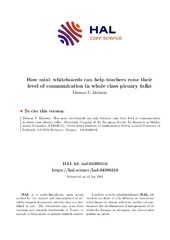How mini–whiteboards can help teachers raise their level of communication in whole class plenary talks
Author
Eidissen, Thomas FrantzenAbstract
This study investigates if using mini-whiteboards can change communication practices in a classroom using a before-and-after approach. Change in teaching practices was analysed using a framework described by Brendefur and Frykholm (2000). The data for this paper were collected on a lesson before the introduction of the mini-whiteboards, and a lesson three months after the introduction of the tools. The second lesson is part of the shared data within TWG19 for CERME13. Using turn-byturn analysis, the teachers’ statements in the whole class plenary talks were analysed against the framework. The findings show no significant improvement in the teacher’s guidance of the whole class plenary talks within Brendefur and Frykholm’s (2000) framework, but there are some changes worth reporting on. These changes were twofold. The first change was that the teacher used less of the codes yes and no questions and guess what the teacher is thinking questions. The second change was that the mini-whiteboards created opportunities to raise the communication to reflective.
Description
Source at https://hal.umontpellier.fr/hal-04430809.
Publisher
Alfréd Rényi Institute of Mathematics, Budapest, Hungary and ERMECitation
Eidissen: How mini–whiteboards can help teachers raise their level of communication in whole class plenary talks. In: Drijvers P, Csapodi, Palmer H, Gosztonyi, Kónya. Proceedings of the thirteenth Congress of the European Society for Research in Mathematics Education (CERME13), 2023. European Society for Research in Mathematics Education p. 3560-3567Metadata
Show full item recordCollections
Copyright 2023 The Author(s)


 English
English norsk
norsk